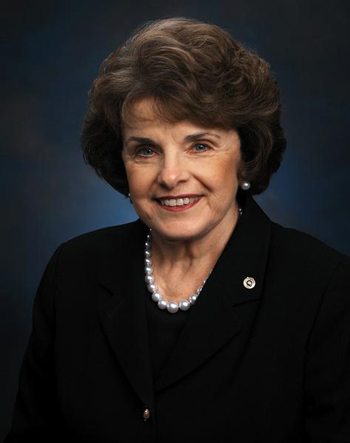May 1, 2018 - Washington—Senator Dianne Feinstein (D-Calif.) on Monday called on Transportation Secretary Elaine Chaoday called on Transportation Secretary Elaine Chao to release funding for infrastructure projects in California and end delays  implementing the Capital Investment Grants program.
implementing the Capital Investment Grants program.
“These thirteen projects have been made possible by decades of hard work from communities throughout California, with bipartisan support in Congress,” Senator Feinstein wrote. “The federal commitment of funding for these projects averages only 45 percent of the total costs, far less than the federal share of up to 80 percent on comparable highway projects. These projects deserve the fair and timely administration they are owed by a program that has been duly authorized and appropriated.”
Full text of the letter follows:
April 30, 2018
The Honorable Elaine Chao
Secretary
U.S. Department of Transportation
1200 New Jersey Avenue SE
Washington, DC 20590
Dear Secretary Chao:
Given passage of the 2018 Consolidated Appropriations Act and Congress’s clear direction to continue the Federal Transit Administration’s Capital Investment Grant program, I write to ask for your leadership to fully implement the program, end recent administrative delays, and resume recommending new projects for funding.
As the only opportunity for the federal government to partner in the construction of major transit improvements, the Capital Investment Grant program is critical for reducing congestion on our roads, making transportation more affordable, reducing pollution, and reinvesting in our future.
Congress has now twice rejected proposals from the Trump Administration to terminate the Capital Investment Grant program and instead has strongly reaffirmed its bipartisan commitment to not only continuing, but actually expanding, the program. For Fiscal Year 2018, the law provides $2.645 billion, a 10 percent increase over the 2017 level, and a 22 percent increase over the 2016 level.
To ensure there is no confusion about the intent of Congress, the 2018 appropriations law imposed a new requirement that 85 percent of funding be spent within twenty-one months, and included new written direction “to administer the capital investment grants program in accordance with the requirements of 49 U.S.C. 5309,” to “move projects through the program from initial application to construction,” and “to provide updated project ratings expeditiously at the request of the project sponsor.”
I would like to be clear about what this means for my home state of California. Included in the 2018 appropriations law is full funding for all multi-year capital investment grants that are already underway, including:
1. $23 million for the ninth and final year of funding for Phase 2 of the Third Street Central Subway in San Francisco;
2. $97.4 million for the seventh and final year of funding for Phase 1 of the Silicon Valley BART Extension in San Jose;
3. $100 million for the fifth of seven years of funding for the Regional Connector in Los Angeles;
4. $100 million for the fifth of thirteen years of funding for Section 1 of the Westside Purple Line Extension in Los Angeles;
5. $100 million for the third of twelve years of funding for Section 2 of the Westside Purple Line Extension in Los Angeles;
6. $100 million for the third of eleven years of funding for the Mid-Coast Corridor in San Diego; and
7. $100 million for the second of six years of funding for Caltrain Electrification in the Bay Area.
Finally, the law directs the Department to provide projects with impartial technical ratings and fair recommendations for future funding, which should be made with an understanding of the unwavering long-term Congressional support for the program. The projects currently preparing for funding or advancement in FY 2019 include:
These thirteen projects have been made possible by decades of hard work from communities throughout California, with bipartisan support in Congress. The federal commitment of funding for these projects averages only 45 percent of the total costs, far less than the federal share of up to 80 percent on comparable highway projects. These projects deserve the fair and timely administration they are owed by a program that has been duly authorized and appropriated.
After last year’s appropriations were enacted, you agreed to allow the Caltrain Electrification project to move forward, keeping your commitment to implement the law. This year’s appropriations again provide funding and direction in support of all of the transit projects pursuing a Capital Investment Grant. I ask for your leadership to make this program a continued success.
Sincerely,
Dianne Feinstein
United States Senator
